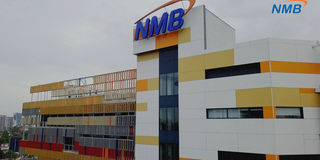Prime
NMB Bank shines as more Tanzania's firms appear on East Africa's top list

What you need to know:
- With a market capitalisation of about $5 billion, Kenya’s Safaricom remains the largest company in East Africa
Dar es Salaam. Years of sustained growth, guided by a smooth execution of its strategic plan and boosted by Tanzania’s sound economic performance, have seen NMB Bank Plc sit on the list of most valuable companies in East Africa, the latest data shows.
An analysis of stock market data for the past five years shows that the now-over Sh11 trillion lender, which started as a small bank in 1997, has grown tremendously from being the 10th most profitable bank in East Africa in 2018 to settle comfortably on position three, challenging some of the largest companies that have historically been occupying the coveted top spots.
With a market capitalisation of about $5 billion, Kenya’s Safaricom remains the largest company in East Africa and is followed by Mauritius Commercial Bank (MCB), which has a market capitalisation of $1.7 billion. In third place is TBL, while MTN Uganda comes in fourth. Kenya’s Equity Bank ranks fifth, while NMB Bank Plc occupies the sixth position.
On the list of the top ten companies in East Africa in terms of market capitalization, both Tanzania and Kenya are currently producing four each, while Mauritius and Uganda have one each.
Locally, with a market capitalization of Sh2.2 trillion as of September 5, 2023, NMB Bank Plc currently stands at position two and is only second to TBL.
The lender has improved from the fourth position that it occupied as of September 5, 2018.
Vodacom and TCC follow in the third and fourth positions, respectively.
In terms of profitability, NMB Bank now ranks as the third-most profitable bank in East Africa after Kenya’s Equity Bank and KCB Bank. During the first half of 2023, NMB Bank Plc registered a profit after tax (PAT) increase of 27 percent year-on-year to Sh262 billion.
Calculated using an exchange rate of 1 Kenyan Shilling to 16.9 Tanzanian Shillings, the analysis shows that Equity Bank registered a PAT of Sh430 billion, while KCB and Co-op got Sh264 billion and Sh205 billion, respectively.
In 2022, NMB registered a record PBT of Sh617 billion, which was the highest ever in the history of Tanzania’s banking sector.
According to the NMB Bank Plc managing director, Ms Ruth Zaipuna, the results of the analysis were an indication that Tanzania’s economy has been doing well in recent years.
As such, Tanzanian companies have been operating well and yielding returns to investors.
“This growth story is a testament to two things: the positive operating environment in Tanzania and the Bank’s relentless focus on sustainable long-term growth as guided by its Medium-Term Plan (MTP),” Ms Zaipuan said yesterday.
She said the government of Tanzania has created an enabling business operating environment that has propelled distinguished growth.
Broad-based economic growth has turned Tanzania into one of the fastest-growing economies in Africa, with the World Bank now projecting that the country’s economy will be one of Africa’s best-performing ones this year with GDP growth of 5.3 percent in comparison with a continental average of 3.6 percent.
The growth, propelled by a conducive business environment, has enabled increased consumer demand, credit growth, and an overall diversified economy that is well sanitised.
Looking forward, Ms Zaipuna said the bank’s vision was to increase its market share and sustain its growth trajectory. “We remain ever so committed to continue delivering strong returns to our shareholders and a positive impact on the socio-economic development agenda,” she said.
The chairman of NMB Bank’s board of directors, Dr Edwin Mhede, said the lender was committed to continuing to play a greater role in driving Tanzania’s growth agenda’.
“We endeavour to hold true to our values and belief that ‘high standards of corporate governance are a key contributor to the long-term success of the bank’. We therefore remain steadfast to our commitment to taking a long-term approach to decision-making, with the creation of lasting value for our stakeholders at the heart of the board’s operations,” he said.




